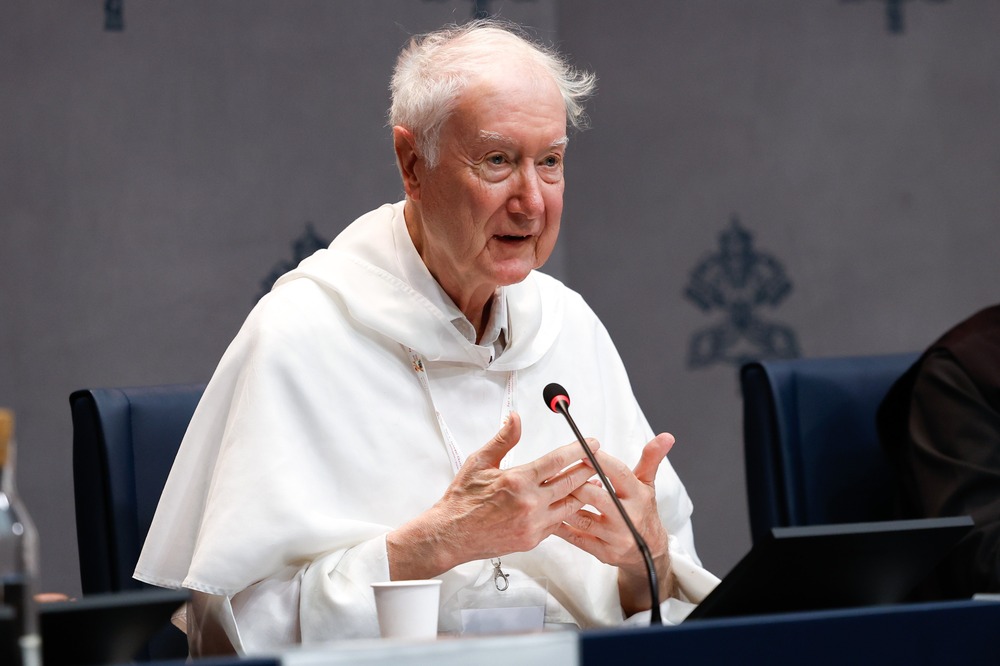
Cardinal-designate Timothy Radcliffe, theologian and former master of the Dominican order, who has been serving as a spiritual adviser to the Synod of Bishops on synodality, speaks at a press briefing about the synod at the Vatican Oct. 21, 2024. (CNS/Lola Gomez)
Even if some members of the Synod of Bishops end up feeling disappointed by the results of the synod, "God's providence is at work in this assembly, bringing us to the Kingdom in ways that God alone knows," the spiritual adviser to the synod on synodality told them.
"The triumph of the good cannot be frustrated," and "we may be at peace whatever the result" of the synod's month long second session, said Cardinal-designate Timothy Radcliffe, offering his morning reflection in the Vatican's Paul VI Audience Hall Oct. 21 before members began reading, discussing, amending and voting on the final document to be presented to Pope Francis Oct. 26.
He also cautioned people, especially the media, against trying to look for "startling decisions, headlines" to come out of the final text, saying, at a Vatican briefing with reporters, that that would be a mistake.
The document will need to be read as something seeking to bring deep renewal of the church not "through dramatic decisions, but it evokes new ways of being a church in which we relate to each other much more profoundly in Christ and to Christ much more profoundly with each other," he said at the afternoon briefing.
"I think many people in the synod, out of the synod, in the church, still struggle to understand the nature of the synod. They still tend to see it as a parliamentary body which will make big administrative, structural changes. I think it's natural because that's the model that dominates our world," he told reporters. "But we've seen and it's been repeated endlessly that is not the sort of body it is."
The world is experiencing growing "violence and war, social disintegration. You've only to look at the election process in the United States to see how there is a danger of social collapse," he said. "In this perilous difficult moment, I think the church has a very particular vocation to be a sign of Christ's peace and Christ's communion and that means all sorts of steps which will not make headlines."
The Dominican theologian helped open the final week of the Oct. 2-27 assembly with a reflection in the morning on how members should embrace their freedom and responsibility.
"Christ has set us free," he said, and "our mission is to preach and embody this freedom."
This freedom, however, has two features: "It is the freedom to say what we believe and to listen without fear to what others say, in mutual respect," he said, and it is the freedom of knowing that God always works for the good of those who love God.
"God's providence is gently, silently at work even when things seem to go wrong," Radcliffe said.
Advertisement
"If we have only the freedom to argue for our positions, we shall be tempted by the arrogance of those who, in the words of (Jesuit Father Henri) de Lubac, see themselves as 'the incarnate norm of orthodoxy.' We shall end up beating the drums of ideology, whether of the left or the right," he said.
"If we have only the freedom of those who trust in God's providence but dare not wade into the debate with our own convictions, we shall be irresponsible and never grow up," he added. "God's freedom works in the core of our own freedom, welling up inside us."
"The more it is truly of God, the more it is truly our own," he said, pointing to some lessons offered by two theologians who had been silenced and shunned at one point by the Catholic Church's hierarchy — popes and Vatican officials — in Rome.
The late Dominican Father Yves Congar wrote "that the only response to this persecution was 'to speak the truth. Prudently, without provocative and useless scandal. But to remain — and to become more and more — an authentic and pure witness to that which is true,'" he said.
This shows, he said, "we need not be afraid of disagreement, for the Holy Spirit is at work even in that."
And the late Father de Lubac, who also "endured persecution," wrote that "far from losing patience," the one who is being persecuted "will try to keep the peace" and strive "to retain a mind bigger than its own ideas," the cardinal-designate said.
A Christian must cultivate the freedom to transcend himself and avoid "'the terrible self-sufficiency which might lead him to see himself as the incarnate norm of orthodoxy,' for he will put 'the indissoluble bond of Catholic peace' above all things," he said.
"Often we can have no idea as to how God's providence is at work in our lives. We do what we believe to be right and the rest is in the hands of the Lord," he said.
"This is just one synod. There will be others. We do not have to do everything, just take the next step," he said, and those who come after will "go on beginning. How, we do not know. That is God's business."






